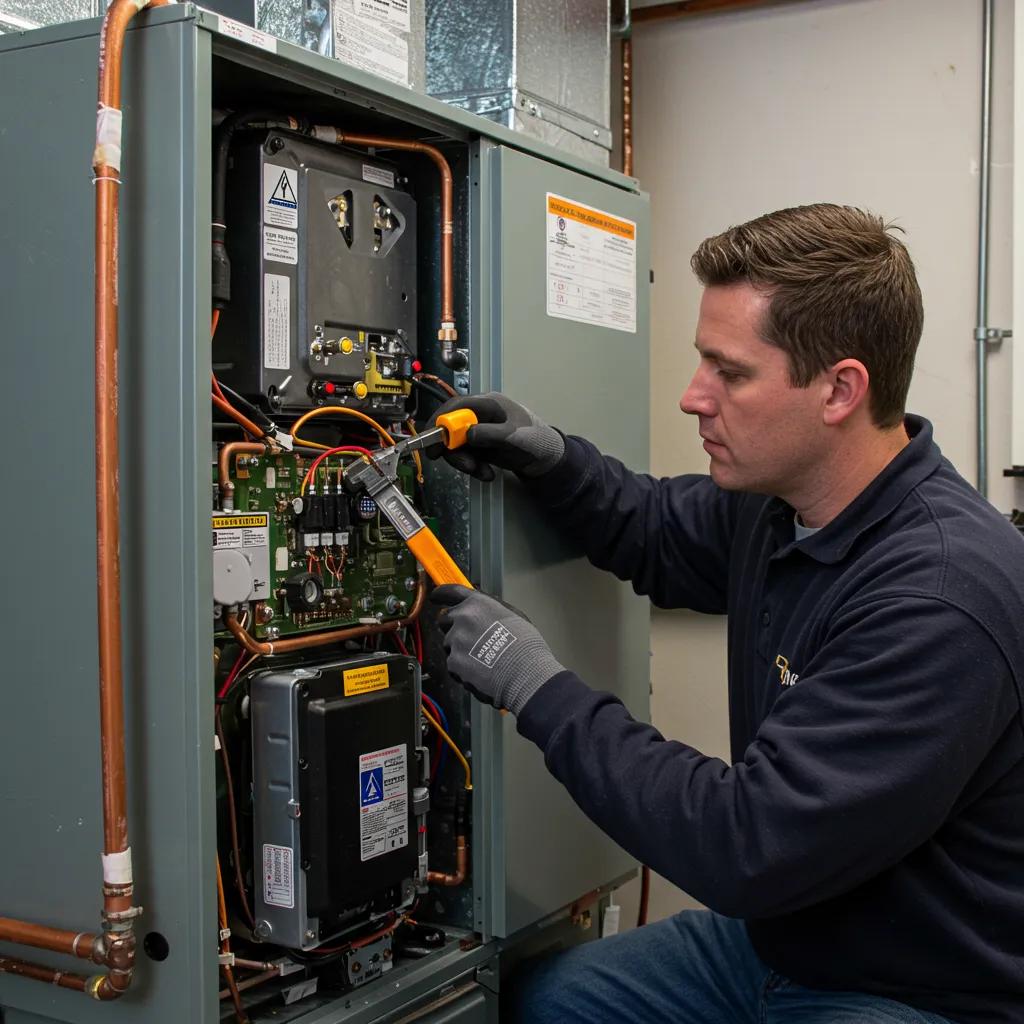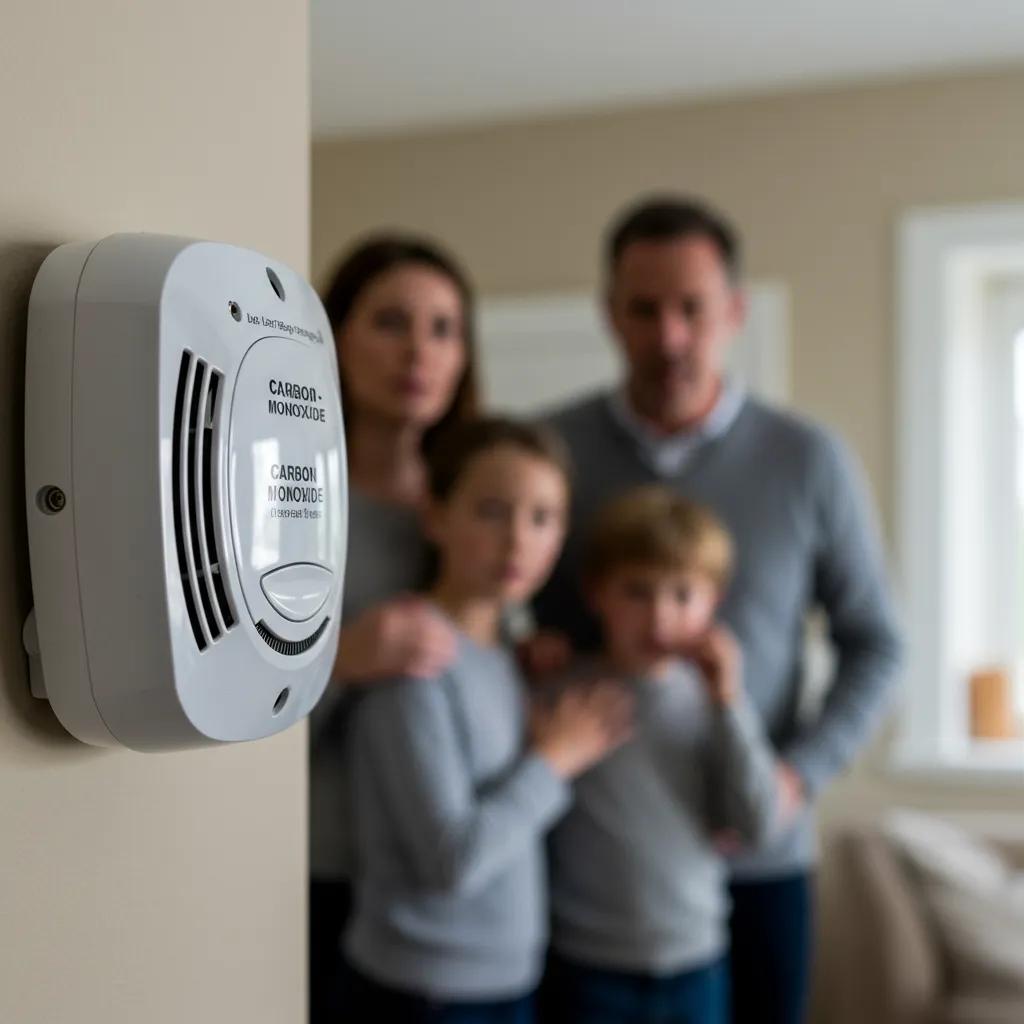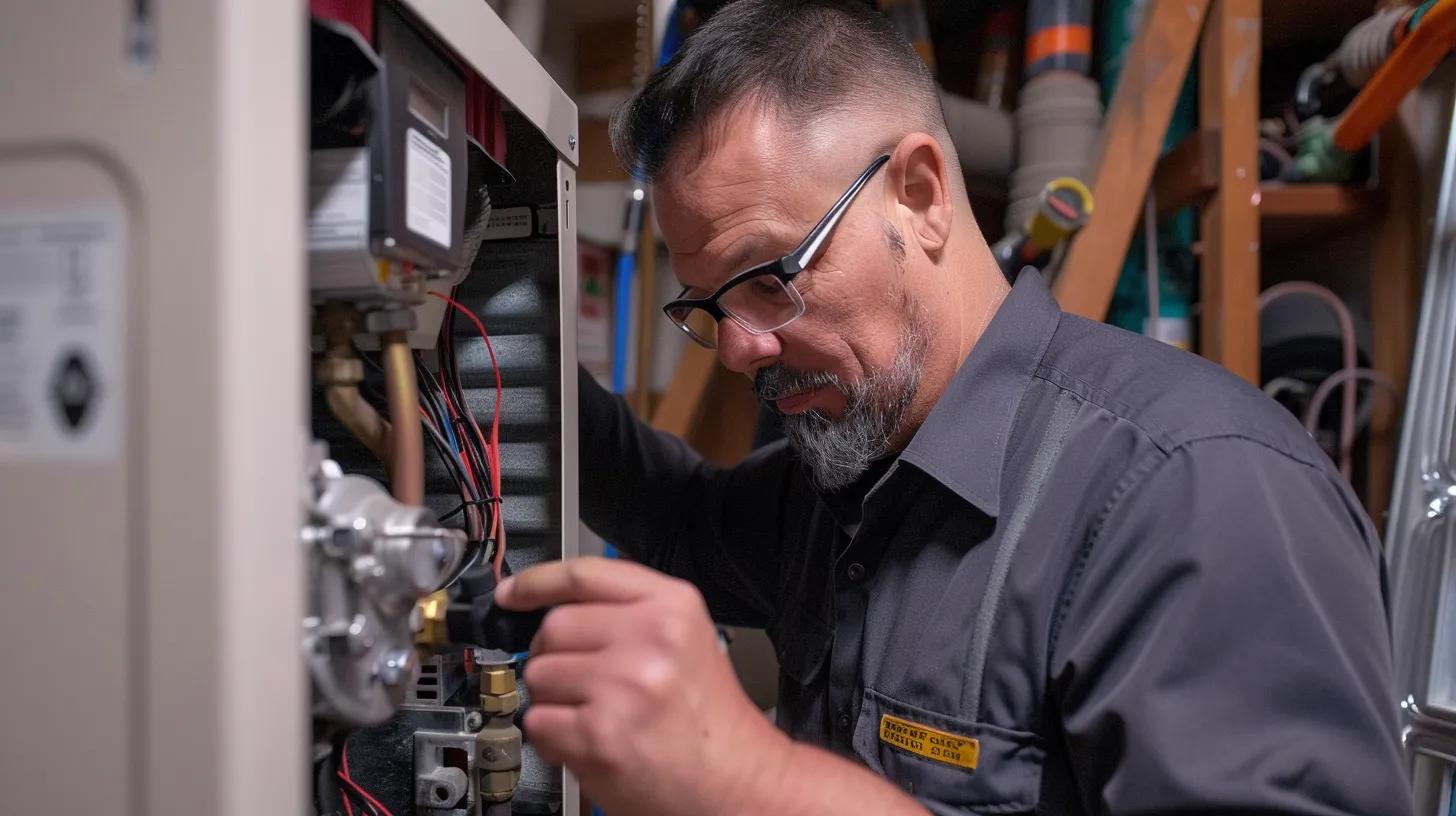Is Your Furnace Acting Up? Spot the Signs and Call the Pros!
A sudden heating breakdown can leave your home or business freezing and vulnerable. Knowing the early warning signs of furnace trouble means you can get it fixed before a small issue becomes a big, expensive problem. This guide points out the most common signs your furnace needs attention—from weird noises and strange smells to pilot light issues, higher energy bills, and even carbon monoxide risks. We’ll show you how the experts at Just Cooling Air Conditioning and Heating can prevent breakdowns, boost efficiency, and keep your indoor air healthy.
Furnace Maintenance: Warning Indicators and Professional Servicing
A sudden failure of the heating system can render a property susceptible to cold-induced damage and safety risks. Identifying the earliest indicators of furnace malfunction empowers residential and commercial property owners in Atlanta, Duluth, Marietta, and Suwanee, GA, to take action before minor problems escalate. This article outlines the most significant signs necessitating furnace maintenance—ranging from anomalous sounds and peculiar odours to pilot light alerts, escalating energy expenditures, and carbon monoxide hazards—and subsequently elucidates how professional intervention by Just Cooling Air Conditioning and Heating averts system failures, enhances operational efficiency, and ensures the integrity of indoor air quality.
Carbon Monoxide
5 Essential Signs Your Furnace Needs Maintenance
The first signs your furnace needs a check-up usually involve mechanical glitches, combustion problems, or efficiency dips that mess with your comfort and safety. Tackling these early can save you from costly breakdowns and help your furnace last longer. Keep an eye out for strange noises, odd smells, a pilot light that’s not quite right, surprisingly high utility bills, or any hint of carbon monoxide.
Here’s a quick rundown of the main warning signs and what to do.
| Warning Signal | Symptom Detail | Recommended Action |
|---|---|---|
| Strange Noises | Banging, squealing, rattling during cycles | Turn off the furnace and schedule a pro inspection |
| Unusual Smells | Burning dust, musty odors, rotten-egg scent | Ventilate right away and call a certified technician |
| Yellow or Flickering Flame | Incomplete combustion indicated by color | Shut off the gas and book a combustion analysis |
| High Energy Bills | Bill spike despite consistent use | Check filters, heat exchanger, and ductwork integrity |
| Carbon Monoxide Signs | Headaches, detector alarms, soot deposits | Evacuate immediately and call for emergency furnace service |
Once you know these key signs, you’re ready to dive deeper into each one, starting with those puzzling furnace noises.
How Can Strange Noises Indicate Furnace Problems?

Weird furnace noises usually happen when parts get out of whack, lose lubrication, or aren’t structurally sound anymore. Banging often means loose blower parts are hitting the casing, while squealing points to worn-out belts or bearings. Rattling could be debris in the blower housing or a motor that’s on its way out.
- Loose Parts: Banging suggests components are rattling around due to vibrations.
- Motor Wear: Squealing means bearings are rubbing or belts are misaligned.
- Debris Intrusion: Rattling occurs when objects bump into moving parts.
Getting these mechanical issues fixed with professional lubrication, belt changes, or part adjustments will prevent further damage and keep your running smoothly.
What Do Unusual Furnace Smells Mean and When Should You Act?
Strange furnace smells are a heads-up about maintenance needs, inefficient combustion, or safety risks. A burning dust smell often appears after the furnace has been off for a while and usually clears up. But persistent burning plastic or electrical smells mean there’s a wiring issue. Musty or moldy odors suggest moisture buildup in the ducts or a corroded heat exchanger. And that rotten-egg smell? That’s a natural gas leak, and you need to get out immediately. For any issues, consider our .
| Smell Type | Probable Cause | Immediate Step |
|---|---|---|
| Burning Dust | Dust settled on the heat exchanger | Run the fan; schedule filter and component cleaning |
| Electrical/Plastic | Overheating wires or control board | Turn off the furnace; request an electrical safety check |
| Musty/Moldy | Moisture in ductwork or exchanger | Inspect ducts; arrange professional dehumidification |
| Rotten Eggs/Gas | Natural gas leak | Evacuate; call the gas company and HVAC service |
Quickly identifying these smells and acting fast not only protects your air quality but also prevents dangerous fires and explosions. Now, let’s talk about air filtration lights.
Why Is a Yellow or Flickering Pilot Light a Warning Sign?
A healthy furnace pilot light burns with a steady blue flame. If it’s yellow or flickering, it means combustion isn’t complete, which can produce carbon monoxide. This usually happens because of soot-clogged burners, blocked air intakes, or a cracked heat exchanger.
- Incomplete Combustion: A yellow flame means too much carbon is present, risking poisoning.
- Blocked Burners: Flickering occurs when soot or debris restricts airflow.
- Heat Exchanger Damage: Cracks can let CO mix with your warm air, which is very dangerous.
Turn off the gas and get a professional combustion test to ensure safe operation and prevent dangerous carbon monoxide buildup.
How Do High Energy Bills Signal Furnace Inefficiency?
A sudden jump in your energy bills often points to hidden maintenance issues that are making your furnace inspection work harder than it needs to. Dirty filters restrict airflow, corroded heat exchangers don’t transfer heat well, and inefficient burners waste fuel. All of this drives up your energy use.
- Dirty Filters: Block airflow, making the blower motor work overtime.
- Heat Exchanger Fouling: Reduces heat transfer, meaning the furnace runs longer.
- Burner Misalignment: Wastes fuel during uneven combustion cycles.
Letting Just Cooling Air Conditioning and Heating clean filters, service heat exchangers, and calibrate burners can cut your heating costs by up to 20% and get your system running like new.
What Are the Signs of a Carbon Monoxide Leak from Your Furnace?

You might not even notice a carbon monoxide leak from your furnace until people start feeling sick or the detectors go off. A cracked heat exchanger, incomplete combustion, or blocked flue pipes can let CO escape into your home.
- Detector Alerts: Alarms mean CO levels are higher than they should be.
- Physical Symptoms: Headaches, nausea, or dizziness when the furnace is running.
- Visible Soot: Dark marks around the exhaust vent can signal leaks.
Get everyone out, ventilate the area, and call for emergency furnace service immediately to find and fix the problem before it causes serious health issues.
How Can You Recognize and Respond to Furnace Noise Issues?
Furnace noises usually mean something is wrong with the mechanical parts or airflow. Different sounds point to different problems that need specific fixes. Knowing these sounds can help you catch issues early and get a professional inspection before things get worse.
What Types of Furnace Noises Indicate Mechanical Faults?
Mechanical problems create distinct noises that help pinpoint the issue.
- Grinding: Metal-on-metal sounds from worn bearings or a misaligned blower wheel.
- Screeching: Friction from belts or motor bearings that need lubrication or replacement.
- Thumping: Loose panels or ductwork vibrating against the furnace cabinet.
When HVAC pros can identify these sounds, they can find the exact part that’s failing and fix it correctly.
How Should You React to Banging, Squealing, or Rattling Sounds?
- Turn off the furnace to avoid causing more damage.
- Check the blower access panel for loose screws or any debris.
- Schedule a professional inspection to get bearings lubricated, belts adjusted, and panels secured.
Acting fast can prevent the motor from burning out and keep your running when you need it most.
When Is It Time to Schedule a Furnace Noise Inspection?
- The noise continues for more than three heating cycles in a row.
- The noise gets louder when the furnace starts up or shuts down.
- You notice other problems, like uneven heating throughout your home.
Booking a diagnostic service with Just Cooling Air Conditioning and Heating at the first sign of trouble can save you from expensive motor replacements and ductwork repairs.
What Do Different Furnace Smells Reveal About Maintenance Needs?
The smells coming from your furnace can tell you a lot about its maintenance and safety status. Understanding these scent clues helps you figure out if it’s just a minor issue, a health concern, or a critical leak that requires immediate action.
What Does a Burning Smell from Your Furnace Indicate?
A brief burning dust smell after the furnace has been off for a while is normal as dust burns off. But if the smell of burning plastic or electrical components lingers, it means something is overheating. In this case, you might need to replace the filter, clean the blower compartment, or have the control board checked to prevent a wiring fire.
How to Identify and Handle Musty or Moldy Furnace Odors?
Musty or moldy smells usually mean moisture is building up in your ductwork, the condensation pan, or inside the heat exchanger. To fix this:
- Swap out your HVAC filters for high-efficiency ones.
- Schedule professional duct cleaning and a disinfectant treatment.
- Fix any leaks that are letting moisture get in.
These steps will improve your and stop mold and mildew from growing.
What Should You Do If You Smell Rotten Eggs or Gas?
- Get everyone out of the building immediately.
- Open windows and doors to air out the space.
- Turn off the main gas valve at the meter.
- Call your gas company to check for a leak, and then schedule professional furnace service.
Quick action can prevent fires, explosions, and carbon monoxide poisoning.
Why Is Monitoring Your Furnace’s Pilot Light Crucial for Safety?
The pilot light is key to igniting your furnace and indicates its combustion health. Keeping an eye on it helps prevent hidden dangers, keeps your system efficient, and ensures you have heat when the temperature drops.
What Does a Yellow Pilot Light Mean for Your Furnace’s Health?
A yellow pilot light means combustion isn’t complete, and excess carbon is building up on the burners instead of being vented as CO₂. This makes the furnace less efficient and produces more carbon monoxide. You’ll likely need to clean the burners, adjust the air shutter, or have the heat exchanger inspected.
How Can a Flickering Pilot Light Signal Carbon Monoxide Risk?
A flickering pilot light often happens when airflow is unstable or the burners are partly blocked, causing the flame to waver. This instability can go hand-in-hand with incomplete combustion, which increases carbon monoxide production. It’s a sign you need immediate professional attention.
What Immediate Steps Should You Take If You Notice Pilot Light Issues?
- Turn off the gas supply to stop CO from building up.
- Ventilate the furnace area by opening nearby doors.
- Schedule a combustion analysis and a check of the heat exchanger’s condition.
These steps ensure your furnace operates safely and prevent silent CO leaks.
How Do High Energy Bills Indicate Furnace Maintenance Problems?
An unexpected jump in your heating bill usually means your furnace is worn out or hasn’t been maintained properly. Finding the root cause and scheduling professional efficiency checks can get your system back to performing its best and lower your costs.
What Causes Your Furnace to Use More Energy Than Usual?
Several things can make your furnace guzzle more energy:
- Clogged Filters: They block airflow, forcing the furnace to run longer.
- Dirty Heat Exchanger: It can’t transfer heat efficiently, so the furnace runs more.
- Improper Thermostat Calibration: This leads to the system cycling on and off too much, wasting fuel.
Taking care of these issues with regular maintenance keeps your fuel costs in line with normal usage.
How Can Regular Maintenance Reduce Your Heating Costs?
Regular professional tune-ups make your furnace more efficient by:
- Replacing air filters to ensure proper airflow.
- Cleaning burners and heat exchangers for maximum heat transfer.
- Adjusting controls and thermostats to prevent them from running too long.
These actions can cut your heating bills by up to 20% and help your system last longer.
When Should You Contact a Professional for Energy Efficiency Checks?
Schedule an energy efficiency inspection if you notice any of these:
- Your utility bill has jumped by more than 10% compared to last year.
- Your home isn’t heating evenly, or the system cycles on and off frequently.
- You see soot or corrosion on any furnace parts.
Getting qualified technicians from Just Cooling Air Conditioning and Heating to check things out early keeps your system running at its best and saves you money.
What Are the Warning Signs of Carbon Monoxide Leaks from Furnaces?
Carbon monoxide leaks are incredibly dangerous and need to be detected right away. Knowing the physical symptoms, listening for detector alarms, and spotting furnace defects that let CO escape can prevent poisoning.
How Can You Detect Carbon Monoxide Exposure at Home?
You can detect CO exposure using both technology and your own awareness:
- CO Detector Alarms: Your first alert for this invisible gas.
- Physical Symptoms: Headaches, dizziness, or nausea when the furnace is on.
- Soot Around Vents: Dark residue means exhaust gases might be backing up.
Combining these clues should prompt you to evacuate immediately and call for professional help to fix the leak.
What Furnace Issues Commonly Cause Carbon Monoxide Leaks?
Most CO leaks from furnaces happen because of: .
- Cracked Heat Exchangers: Damage allows gases to escape instead of going up the flue.
- Incomplete Combustion: Soot-clogged burners increase CO levels.
- Blocked Flue Passages: These prevent combustion byproducts from venting properly.
Finding and fixing these problems requires special diagnostic tools and expertise.
What Emergency Actions Should You Take If You Suspect a Leak?
- Get everyone out of the house right away.
- Open windows and doors to air out the building.
- Call for emergency furnace service to do a CO safety inspection.
- Stay somewhere else temporarily until repairs confirm your indoor air is safe.
These steps protect everyone from immediate poisoning and make your home safe again.
How Does Regular Professional Furnace Maintenance Prevent These Issues?
Getting your furnace professionally maintained regularly helps catch problems before they get serious. Scheduled tune-ups, safety checks, and cleanings keep your system efficient, extend its life, and protect your health.
What Are the Benefits of Scheduling Preventative Furnace Maintenance?
Preventative maintenance offers several key advantages:
- Better Safety: Catches CO leaks and combustion problems early.
- Improved Efficiency: Cleaner parts mean less fuel consumption.
- Longer Service Life: Well-maintained components last much longer.
- Warranty Compliance: Many manufacturers require regular service to keep warranties valid.
These benefits mean fewer emergency repairs and lower overall costs.
How Can You Schedule a Furnace Maintenance or Repair Appointment?
Booking a service appointment is simple:
- Call Just Cooling Air Conditioning and Heating to tell us about your furnace and the issues you’re experiencing.
- Let us know your preferred service date and your location in our Georgia service area.
- Confirm your appointment details and get a reminder before our certified technician arrives to inspect and maintain your system.
Furnace problems never happen at a convenient time. By recognizing strange noises, odors, pilot light issues, rising energy bills, and carbon monoxide risks as clear signs your furnace needs attention, you can keep your home or business comfortable and safe all winter. Regular tune-ups and emergency inspections from Just Cooling Air Conditioning and Heating prevent breakdowns and ensure efficient operation. Schedule your professional maintenance today to protect your property from hidden dangers and unexpected heating failures.

